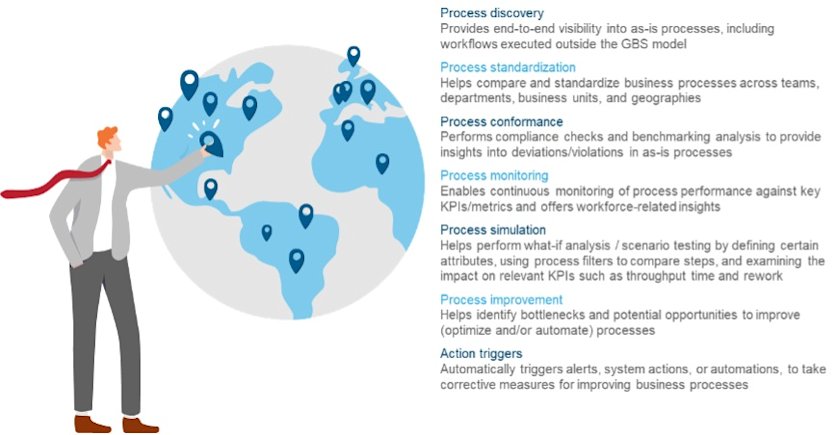
Process Mining in Global Business Services: A Key Enabler for Intelligent Processes
Process mining can help Global Business Services (GBS) organizations overcome key process visibility and transparency challenges by providing fact-based views into business processes and delivering valuable data-based insights. To learn more about process mining benefits, read on.
We are pleased to share this blog from Everest Group guest bloggers, Amardeep Modi, Harpreet Makan, and Samikshya Meher.
Enterprises traditionally established shared services centers to benefit from labor arbitrage, cost savings, and scaled and reliable transactional services delivery. As the breadth, depth, and scope of services offered matured, these organizations evolved into the GBS model.
In addition to efficiency and cost benefits, GBS centers also focus on delivering a mix of transactional and high-skill services across traditional functions (such as finance and HR) and industry-specific functions (including retail banking, claims management, and clinical trials site management).
Many GBS centers deliver advanced digital innovation capabilities and act as global talent hubs. Today’s GBS centers demonstrate greater ownership across processes and products and deliver complex and higher-value services such as business analytics and consulting and marketing services. Increasingly, they are creating higher business impact by improving service quality, enhancing customer experience, and building greater resilience.
But the expanded scope has also brought challenges for GBS organizations. Among the common obstacles are managing less standardized processes and scaling up capabilities across regions and functions, and predicting the Return on Investment (RoI) to build the business case for digital investments. A lack of end-to-end process visibility and operational transparency can be attributed to most of these challenges.
While organizations typically rely on manual approaches to business process discovery and mapping, these methodologies provide an incomplete picture and offer directional views and opinions versus verifiable process flows. Relying on manual approaches also limits GBS organizations’ ability to continuously monitor processes to guide decision-making and improve efficiencies.
To overcome these challenges, GBS organizations can leverage process mining, an analytical discipline that provides a fact-based view into business processes. Let’s explore this powerful solution more deeply.
The full Everest Group report, Process Mining in Global Business Services: Driving Operational Excellence through Intelligent Processes, is available to download for free.
What is process mining?
Process mining is software that helps discover and analyze as-is processes, generate process maps, and extract relevant business insights – leveraging event log data generated by enterprise systems such as Enterprise Resource Planning (ERP), Customer Relationship Management (CRM), and Supply Chain Management (SCM).
It provides in-depth visualization of processes and allows enterprises to detect anomalies that hinder process efficiencies. Through process mining, enterprises can monitor and optimize the processes in near real-time by assessing the impact on different Key Performance Indicators (KPIs) and custom metrics.
Process Mining Benefits for GBS Organizations
As GBS organizations focus on delivering greater value, improving efficiencies through process management becomes key. Further, several GBS organizations have shown significant potential to become in-house process-improvement advisors and executors for global enterprises.
Process mining can add value to these improvement efforts by providing a fact-based view for a deeper understanding of the underlying processes. Through data-backed insights, process mining can help identify process bottlenecks, recommend improvement levers, and drive best practices through process standardization.
Additionally, as GBS organizations integrate operations across regions, business units, service lines, and functions, process mining helps compare, benchmark, and standardize processes at scale and improve overall process performance.
How process mining benefits GBS organizations in enabling intelligent and efficient processes
Process mining adds intelligence to processes as illustrated in the exhibit below:

Source: Everest Group
Process Mining Advantages for Finance and Procurement Functions
Process mining improves process visibility into common GBS functions and, consequently, delivers superior customer experience and greater value to enterprises. Let’s look at how process mining benefits finance and procurement areas:
Accounts Payable (AP)
AP processes are often fraught with challenges such as manual invoice processing, lack of as-is process visibility, and absence of standardization across business units. Thus, it becomes difficult to identify areas directly affecting costs and processing times and eventually impacting free working capital and supplier satisfaction.
In such cases, process mining brings together data collected from multiple source systems (such as ERP solutions) to determine process performance against defined KPIs. It analyzes the collected process data to identify the root cause of delays or inefficiencies. For example, it can help identify invoices with missed discounts and invoices that can be paid later to maximize free cash flow.
Further, it triggers alerts and notifications of any potential Service Level Agreement (SLA) breaches and recommends the next-best actions by highlighting high-priority invoices to a manager. As a result, process mining enables on-time payment, higher cash discounts, and optimized working capital.
Accounts Receivable (AR)
As GBS organizations continue to focus on streamlining and improving AR processes, such as collection prioritization and cash acceleration, inefficient and redundant processes trap a large amount of the working capital. The lack of process visibility and inability to roll up data from disparate information systems for timely decision-making are major roadblocks to improving these processes.
Process mining provides a consolidated view of client portfolios on all systems of record as well as the time taken for collections. It benchmarks KPIs such as Daily Sales Outstanding (DSO) across geographies, business units, buyers, and systems of record to determine the problem areas.
Using past data, process mining also can predict payment likelihood, improve and prioritize collection efforts, and recommend optimal credit limits to mitigate non-payment risks. Enterprises using process mining have reduced past-dues receivables, lowered past-due payment rates, and freed up working capital.
Procurement
Procurement functions within GBS organizations run into data management difficulties because of the large supplier base and limited spend visibility due to maverick buying. Further, the need to collaborate with multiple stakeholders leads to inordinate delays in identifying suppliers and negotiating contracts.
Process mining helps overcome these issues by offering a holistic view of spend activities and supplier performance that helps equip resources with the right data for negotiation.
It also helps identify deviations and the factors responsible for inferior performance (such as maverick buying, manual price changes, and non-compliance to internal processes) and their impact on the overall spend as well as opportunities for automation technologies. Thereby, it contributes to lower processing time and increased cost savings.
Order management
While GBS organizations aim to deliver a superior customer experience, they face difficulties in ensuring on-time delivery and reducing processing time and costs due to the absence of operational visibility. Having fragmented operations across multiple channels, such as emails, calls, and messages, and multiple handoffs between teams often results in errors, invoice queries, and disputes.
Process mining provides an integrated view of the order management process carried out across channels and transactional systems. It delivers near real-time KPI monitoring and data-backed insights on customer behavior patterns. Process mining also prevents errors by detecting repetitive manual steps that can be automated and helps identify and resolve order errors and blocks for timely processing.
As GBS organizations expand the scope of their operations, process mining can be a valuable tool in the automation technologies toolbox to provide strategic benefits to global enterprises. Process mining holds the true potential to enable superior business outcomes by enabling a deeper understanding of processes using a data-based approach.
Get the free Everest Group report - Process Mining in Global Business ServicesAbout the authors
Amardeep Modi is a Vice President with Everest Group. Harpreet Makan is a Practice Director with Everest Group. Samikshya Meher is a Practice Director with Everest Group.



